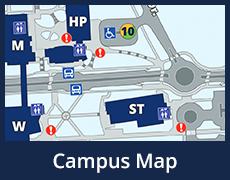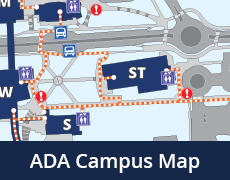Policy Number: II-7
Effective Date: February 1, 2019
Last Reviewed: November 14, 2024
Responsible Dept.: Financial and Administrative Services
A signed copy of this policy is available in the President’s Office.
Policy
This policy addresses Virginia Western Community College’s (the “College”) safety and security needs while respecting and preserving individual privacy. To ensure the protection of individual privacy rights in accordance with state and federal laws, this policy is adopted to formalize procedures for the installation of surveillance equipment and the handling, viewing, retention, dissemination, and destruction of surveillance records.
Purpose
The purpose of this policy is to regulate the use of Closed Circuit Television (CCTV) security camera systems used to observe and record public areas for the purposes of safety and security. The existence of this policy does not imply or guarantee that security cameras will be monitored in real time 24 hours a day, seven days a week.
Responsibility
The Chief of Campus Police is responsible for (1) authorizing the selection, installation, coordination, operation, modification, management and monitoring of all security cameras pursuant to this policy to include covert security cameras for specific criminal investigations, and (2) receiving complaints regarding the utilization and/or placement of security cameras and determining whether this policy is being followed. A form is included in this policy outlining the required information to request the installation of a security camera.
Information and Educational Technologies (IET) will review security camera requests to ensure compatibility with existing infrastructure and consult with the Police Chief regarding the necessity and viability of the request.
The Virginia Western Campus Police Chief shall be responsible for: (1) the implementation of this policy and for reviewing requests for security camera installations and, (2) monitoring developments in the law and security industry practices to ensure that installed security cameras are consistent with best practices and comply with federal and state laws.
IET shall be responsible for installation and routine maintenance of security camera systems and monitoring developments in new technologies.
The Data Owner and System Administrator of the CCTV security camera systems belongs to the Chief of Police. Access is strictly limited and only for purposes related to the performance of duties pertaining to that authorization. The Chief of Police is responsible to: (1) authorize access and training to the CCTV security camera systems, (2) review and recommend the specific placement of security cameras after determining conformance to this policy, (3) test and verify the security cameras and supporting systems are working, and (4) notify IET of needed repairs.
The System Owner of the CCTV security camera systems belongs to the IET department.
The Chief of Police in conjunction with the Vice President of Financial and Administrative Services will review all public and media requests submitted to the Marketing and Communications Department for the release of records and footage obtained through security cameras and may subsequently present these requests with media to the Director of Marketing & Strategic Communications for distribution.
Information obtained through security camera video recording will be used for safety and security purposes and for law and policy enforcement. Any disclosure of recorded and stored video will be in accordance with the Family Educational Rights and Privacy Act (FERPA), as applicable. Any request for recorded video footage will be made through the Chief of Police or the Vice President of Financial and Administrative Services. The copying, duplicating and/or retransmission of recorded video shall only be authorized by one of the following College personnel:
- College President
- Vice President of Financial and Administrative Services
- Chief of Police
Scope
This policy applies to all personnel and departments of Virginia Western in the use of security cameras and their monitoring and recording systems. Security cameras may be installed in situations and locations where the security and safety of either property or persons would be enhanced. Security cameras will be limited to uses that do not violate a reasonable expectation of privacy. Where appropriate and feasible, security cameras may be placed campus-wide, inside and outside of buildings. Audio recording from security cameras is prohibited excluding those used for law enforcement purposes.
All contract employees, vendors and contractors will abide by this policy while on Virginia Western property or areas owned or controlled by the college.
Legitimate safety and security purposes for a security camera monitoring system include:
- Property Protection: To deter thefts and acts of vandalism or to capture such incidents if they do occur.
- Personal Safety: To deter crimes against persons or to capture incidents if they do occur. This includes the use for prevention of and response to sexual misconduct, and acts of violence as outlined in Virginia Western policy I-46: Policy on Sexual Violence, Domestic Violence, Dating Violence, and Stalking and VF-2: Campus and Workplace Violence Prevention Policy.
- Extended Responsibility: To monitor areas from a remote location when necessary due to lack of personnel or to enhance the security of the area being monitored.
Placement of Cameras
The locations where security cameras are installed may be restricted access sites such as a departmental computer lab; however, these locations are not places where a person has a reasonable expectation of privacy. Security cameras will be located so that personal privacy is maximized. Unless being used for criminal and/or internal policy investigations the location of security cameras will be visible.
Unless the security camera is being used for criminal and/or internal policy investigations by the College Campus Police Department or other law enforcement agency, monitoring by security cameras in the following locations is prohibited:
- Restrooms
- Locker rooms
- Offices
- Classrooms
The installation of “dummy” security cameras is prohibited.
Access and Monitoring
All recording or monitoring of activities of individuals or groups by College security cameras will be conducted in a manner consistent with College policies and state and federal laws, and will not be based on the subjects’ personal characteristics or status as defined in the College’s Notice of Non-Discrimination. Furthermore, all recording or monitoring will be conducted in a professional, ethical, and legal manner.
All personnel with access to view live video from College security cameras must be trained by the Chief of Police in the technical, legal, and ethical parameters of monitoring equipment. The Chief of Police is authorized to view live and recorded video footage for security and investigative purposes. Other personnel with access to view live and recorded footage must only access the footage for specific job-related functions. A copy of this policy outlining standards of appropriate use will be provided to users. Upon separation from the College, access privileges to the CCTV security camera systems will be withdrawn within 24 hours.
College security cameras are not monitored continuously under normal operating conditions but may be monitored for legitimate safety and security purposes that include, but are not limited to, the following: high risk areas, restricted access areas/locations, in response to an alarm, special events, and specific investigations.
Access to monitor live video from security cameras or access to stored video shall be limited to authorized personnel and only for purposes related to the performance of duties pertaining to that authorization.
Personnel are not authorized to monitor or access live or recorded video of the CCTV security camera systems unless the employee is (1) in an official support role or investigative capacity as approved by the Chief of Police or (2) in an official capacity and have received written approval from the Vice President of Financial and Administrative Services to access either live or recorded video.
Unauthorized access to the CCTV security camera systems is not allowed and will not be tolerated. If the system is accessed by an unauthorized person, Campus Police will be notified and will investigate the allegations of unauthorized access. Unauthorized access of the CCTV security camera systems or intentional destruction of or tampering with cameras or monitoring equipment by students, visitors or employees will result, in most cases, in student or employee standards of conduct discipline and/or criminal sanctions.
Appropriate Use and Confidentiality
Information obtained from security cameras shall be used for safety and security purposes and for law and policy enforcement. Cameras may be monitored where appropriate for public functions and/or large gatherings. Information must be handled with an appropriate level of security to protect against unauthorized access, alteration, or disclosure in accordance with College policy related to Privacy of Educational Records I-33, and FERPA. The Library of Virginia’s General Schedule for Records Retention and Disposition will be followed.
All appropriate measures must be taken to protect an individual’s right to privacy and hold College information securely through its creation, storage, transmission, use, and deletion.
All security camera installations are subject to any applicable federal and state laws.
Personnel are prohibited from using or disseminating information acquired from College security cameras, except for official purposes. All information and/or observations made in the use of security cameras are considered confidential and can only be used for official College and law enforcement purposes.
Use of Cameras for Criminal Investigations
Mobile or hidden video equipment may be used in criminal investigations by the College Campus Police Department. Covert video equipment may also be used for non-criminal investigations of specific instances which may be a significant risk to public safety, security and property as authorized by the Chief of Police or his/her designee.
Exceptions
This policy does not apply to:
- Cameras used for academic purposes. Cameras that are used for research are governed by other policies involving human subjects and are, therefore, excluded from this policy.
- Webcams for general use by the College.
- Video equipment for the recording of public performances or events, interviews, or other use for broadcast, marketing or educational purposes. Examples of such excluded activities would include videotaping of athletic events for post-game review, videotaping of concerts, plays, lectures, in-service assemblies, or videotaped interviews of persons.
- Audio/video recording equipment in Campus Police vehicles or department issued body cameras worn by Campus Police Officers. Specific guidelines for the use of body worn cameras (BWC) are directed by the internal College Campus Police Department General Order ADM-33.
- Video that is streamed to or posted to the internet for public affairs projects approved by the Director of Marketing and Strategic Communications.
- Automated teller machines (ATMs), which utilize security cameras.
Storage and Retention of Recordings
No attempt shall be made to alter any part of any security camera recording. Surveillance monitoring stations will be configured to prevent authorized users from tampering with or duplicating recorded information.
All security camera recordings shall be stored for a period of no more than 60 days, after which they may be erased or written over, unless retained as part of a criminal investigation or court proceedings (criminal or civil), in reasonable anticipation of litigation, for administrative or internal investigation, or other bona fide use as approved by the Chief of Police. Individual departments outside of Campus Police shall not store security camera recordings.
A log shall be maintained by the Chief of Police of all instances of access granted to or use of security camera records that are requested. The log shall include the date, purpose and identification of the person or persons to whom access was granted and who authorized the access.
Requests for these recordings must be made via the submission of: Attachment 1 – Request for Surveillance Camera Recording (PDF). Approval of requests for camera recordings are at the discretion of the Chief of Police, the Vice President of Financial and Administrative Services and/or the President or applicable state and federal Freedom of Information (FOIA) laws.
Related Forms & Documents
Request for Surveillance Camera Recording (PDF)
Safety and Security Use Policy (II-7) Training Log (PDF)
Contact Us
540-857-VWCC (8922)
24/7 Student Support Center
855-874-6690
TTY: All users 711
Address:
3094 Colonial Ave., SW
Roanoke, VA 24015
VWCC Alerts
We use the VW Mass Notification System to immediately contact you during a major crisis or emergency. Get more info and register!




